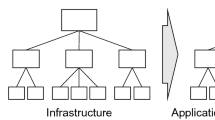Abstract
Next-generation wireless networks are envisaged to provide end-users ubiquitous low-latency computing services using devices at the network edge and machines before reaching the core cloud network. The crucial concepts of driving this technology are to offload computationally intensive tasks from users to edge or fog devices. The mobile edge network consists of an access point (AP), Radio Access Network (RAN), devices, edge servers, fog servers and finally the core cloud network. Given that fog computing is an emerging technology, it is imperative to study the performance of such systems analytically. Though there are many papers on performance analysis, many of them provide heuristic, ad-hoc solutions or pose it as optimization problems. In this work, we model a hierarchical fog architecture using Markov chain analysis and compare it with a flat fog architecture by investigating the different performance measures analytically and by simulation.
Access this chapter
Tax calculation will be finalised at checkout
Purchases are for personal use only
Similar content being viewed by others
References
Dawy Z, Saad W, Ghosh A, Andrews JG, Yaacoub E (2017) Toward massive machine type cellular communications. IEEE Wirel Commun 24(1):120–128
Mozaffari M, Saad W, Bennis M, Debbah M (2016) Unmanned aerial vehicle with underlaid device-to-device communications: performance and tradeoffs. IEEE Trans Wirel Commun 15(6):3949–3963
Park T, Abuzainab N, Saad W (2016) Learning how to communicate in the Internet of Things: finite resources and heterogeneity. IEEE Access 4:7063–7073
Joilo S, Dn G (2019) Decentralized algorithm for randomized task allocation in Fog computing systems. IEEE/ACM Trans Netw 27(1):85–97
D A Chekired, L Khoukhi, HT Mouftah (2018) Industrial IoT data scheduling based on hierarchical Fog computing: a key for enabling smart factory. IEEE Trans Ind Inf 14(10):4590–4602
Kleinrock L (1975) Queueing systems, volume 1—theory. Wiley
Qamar F, Dimyati K, Hindia MN, Noordin KA, Amiri IS (2019) A stochastically geometrical poisson point process approach for the future 5G D2D enabled cooperative cellular network. IEEE Access 7:60465–60485
Author information
Authors and Affiliations
Corresponding author
Editor information
Editors and Affiliations
Rights and permissions
Copyright information
© 2020 Springer Nature Singapore Pte Ltd.
About this paper
Cite this paper
Haneefa, N.K., Pramod, S., Pal, S., Manivasakan, R. (2020). A Markov Chain Based Framework for Analysis of Hierarchical Fog Computing Networks. In: Kim, K., Kim, HY. (eds) Information Science and Applications. Lecture Notes in Electrical Engineering, vol 621. Springer, Singapore. https://doi.org/10.1007/978-981-15-1465-4_5
Download citation
DOI: https://doi.org/10.1007/978-981-15-1465-4_5
Published:
Publisher Name: Springer, Singapore
Print ISBN: 978-981-15-1464-7
Online ISBN: 978-981-15-1465-4
eBook Packages: EngineeringEngineering (R0)




